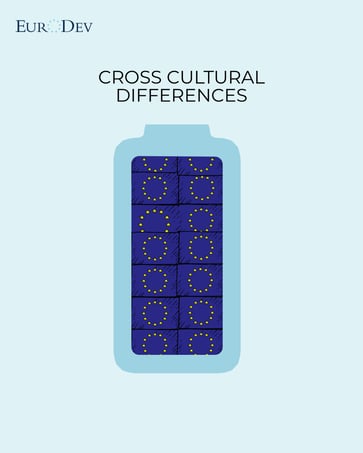Cross-Cultural Differences and Hiring Strategies
All companies share the common goal of attracting (recruiting) and retaining (performance management) top talent. Success hinges on making global goals a local business.
But how to overcome cross-cultural differences when hiring in multicultural Europe?
In this blog, HR Consultant Carolyn Braaksma explains how and why American companies can benefit by adapting their style of recruiting and performance management to fit the non-US culture.
The Complexity of the European Cultural Landscape
Europe consists of 40 countries, each with its own unique culture and employment laws. Presently, 28 of these countries belong to the European Union (EU), which allows residents to travel and work freely.
However, the cross-cultural and labor market differences between these 28 countries are significant, even between neighboring countries such as Belgium and the Netherlands.

Cross-Cultural Differences When Recruiting in Europe
While the goal of recruiting is largely the same around the world, there are observable cultural differences in candidates from different countries. Knowing and understanding your job candidate increases the likelihood of a successful hire, so if candidates are more reserved, the recruiter will have to ask more questions.
When speaking of cross-cultural differences in the context of recruiting in Europe, know that:
- A healthy work-life balance is valued for job candidates in Western European countries, such as Austria and Germany, more than elsewhere;
- Cultural dimensions of organizational behavior reveal more of a hierarchy in southern and eastern European countries. Job titles are important in these regions. There is also a dress code, more formality, and a greater reliance of employees on their manager’s instructions;
- By contrast, in the Netherlands and Sweden, frequently the workplace atmosphere is more informal;
- In countries with more hierarchy, such as Germany, job applicants are unlikely to say no or give their opinion. The Dutch, however, are much more open.
.png?width=1584&name=blog-dm-quote_48144911%20(4).png)
How Cross-Cultural Differences Impact Performance Management
The Western concept of evaluating performance management is more scientific, with a specific process that is valid, reliable, and rational. Around the world, while management and assessment of performance have always been done, it is typically completed more intuitively and organically.

Before utilizing a performance management process from one country to another, organizations should determine whether their global corporate culture is strong enough to enable the performance management process to work across different cultures. This requires HR staff with global expertise to adapt practices as appropriate, which the EuroDev HR Outsourcing team can provide.
Independent of culture, the main objective of any performance management process is to make sure employees know what the company expects of them and how well they are meeting expectations. Organizations may, however, have to tailor and adapt processes in order to make them culturally comfortable for optimal performance from their global employees.
Tackle Cross-Cultural Differences When Hiring in Europe

American companies benefit greatly by adapting their style of recruiting and performance management to overcome cross-cultural differences and fit the non-US culture. EuroDev can provide this specialty in recruiting across Europe.
EuroDev’s HR Outsourcing consultants can provide Recruitment, HR Consulting, and PEO & EOR services for each of these countries. As the employer of record, EuroDev allows North American clients to focus on what they do best – run their operations.
If you want to know more about HR in Europe, please do not hesitate to contact Monique Ramondt-Sanders – VP of Human Resource Outsourcing.
Category
Related articles
-

Essential Guide to French Employment Regulations
22 March 2024comprehensive guide on French employment regulations for companies expanding to France, covering...
Read more -

Germany's Pension Landscape: Navigating Benefits and Taxation for Informed Decision-Making
5 February 2024Dive into the intricacies of the German pension system: benefits, calculations, retirement options,...
Read more -

Decoding Statutory Sick Pay (SSP) in the UK
29 January 2024Navigate the complexities of Statutory Sick Pay in the UK with our guide on rights, regulations,...
Read more

